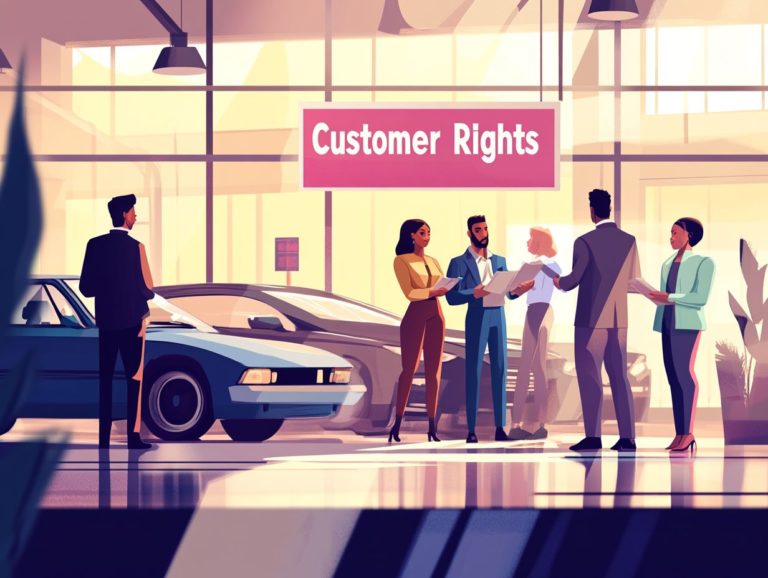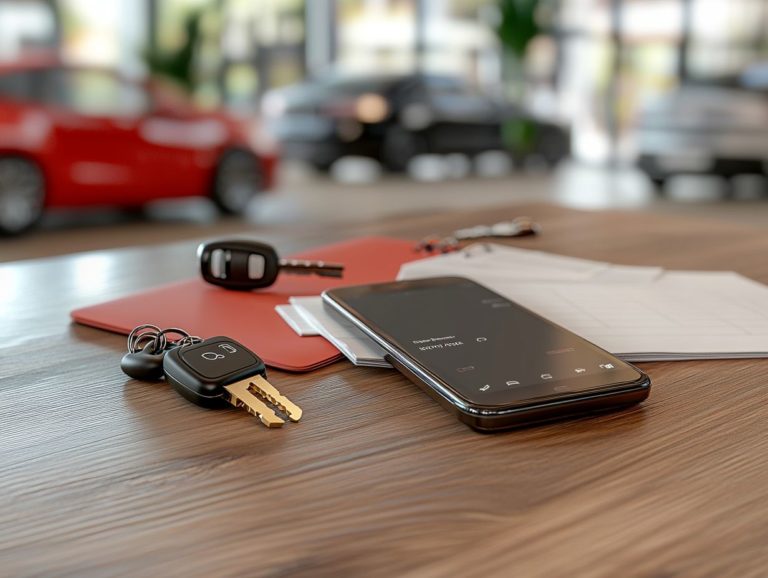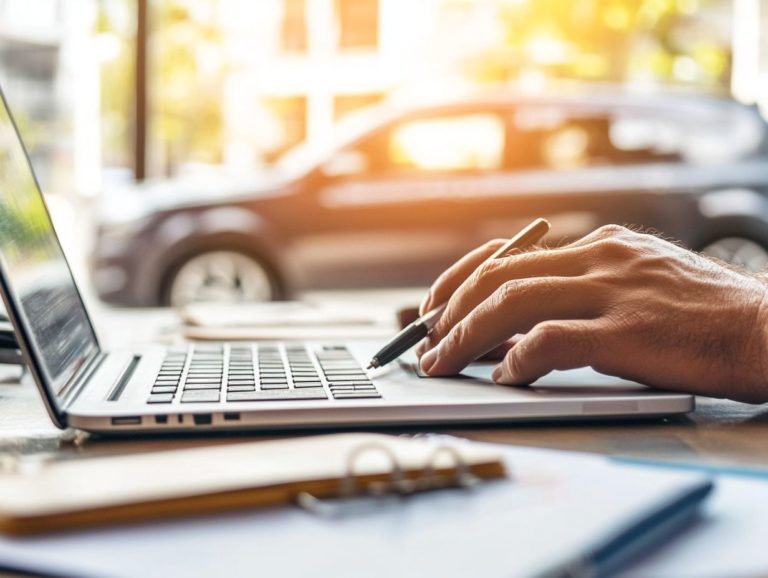The Impact of Trade-Ins on New Car Purchases
When you embark on the journey of buying a new car, understanding the trade-in process can profoundly impact both your experience and your savings.
This guide delves into the essentials of trade-ins, illuminating their significance in the car-buying journey. You ll want to evaluate the pros and cons, understand how they influence the overall cost of your new vehicle, and discover effective strategies for negotiating your trade-in value.
Should you be considering alternatives to trading in, rest assured that those options will also be explored.
Prepare yourself to make informed decisions that not only save you money but also streamline your car purchasing process!
Contents
Key Takeaways:

- Trading in your old car can save you money on the purchase of a new car, as the trade-in value is deducted from the total cost.
- Trade-ins have drawbacks, too, such as potentially receiving a lower trade-in value than the car’s actual worth.
- Consider alternative options such as selling privately or leasing instead of buying a new car.
Understanding Trade-Ins and Their Role in Car Purchases
Understanding trade-ins is crucial in your car purchasing journey. They significantly shape the overall financial landscape by directly influencing the trade-in value of your current vehicle against your new car purchase.
This process typically involves evaluating your vehicle s condition, engaging in negotiations with the dealership, and preparing the necessary paperwork for a seamless transition.
Understanding trade-ins helps you navigate the process better by enhancing your overall customer experience.
What are Trade-Ins?
Trade-ins are essentially your ticket to exchanging your current vehicle at a dealership, helping to offset the cost of your new purchase. This convenient process allows you to transition smoothly between used vehicles without the hassles of private sales.
When you bring your vehicle to a dealership, it undergoes a thorough inspection. Trained professionals will assess its condition, mileage, and market value to present you with a fair trade-in offer. They consider everything from the exterior and interior conditions to any mechanical issues, recent repairs, and comparable sales in your area.
Once your vehicle is appraised, the trade-in options are clearly laid out for you, often alongside financing deals and promotions, making your decision-making process much simpler.
By choosing to utilize trade-ins, you can enjoy immediate financial relief on your new purchase, potentially lower sales tax in many regions, and the peace of mind that comes from a hassle-free transaction ultimately enhancing your overall satisfaction as a customer.
Why They Matter in the Car Buying Process
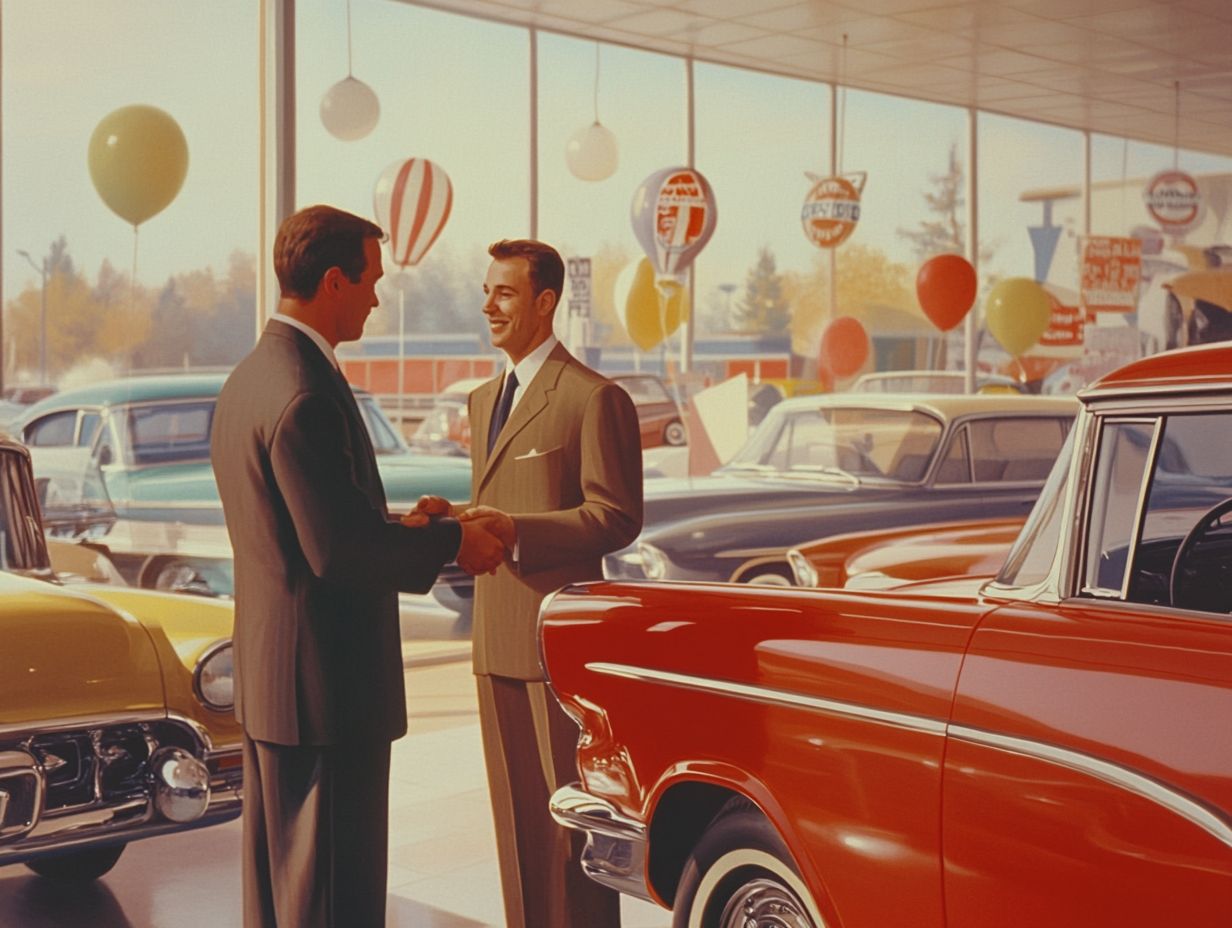
Trade-ins play a pivotal role in the car buying process, significantly influencing the trade-in values, which can substantially lower the overall price when you’re acquiring a new vehicle.
When you choose to trade in your existing car, what might initially feel like a financial liability transforms into a valuable opportunity to offset the costs of your new purchase. This practice can generate positive equity, enabling you to make a sizable down payment on your new vehicle, which in turn helps reduce your monthly payments.
Let s not forget the psychological boost that comes with trade-ins! Many consumers experience a sense of relief and accomplishment upon receiving a fair trade-in value. This not only alleviates potential losses from negative equity but also enhances your overall car ownership experience, making the transition smoother and more financially manageable.
The Pros and Cons of Trading In Your Old Car
Trading in your old car presents a range of advantages and disadvantages that you should carefully evaluate before making a decision.
It’s essential to consider how the trade-in process aligns with your overall vehicle s condition and what it means for your next steps.
Benefits of Trading In
Enjoy the convenience of instant offers from dealerships, making your car transition smooth and easy.
This streamlined process removes the stress of selling your vehicle privately, a task often filled with uncertainties. By taking advantage of the instant offer, you can quickly find a dealer proposal that reflects the current market value of your used car, ensuring you secure a fair deal.
If you re fortunate enough to have positive equity from your trade-in, those extra funds can dramatically lower the financing needed for your new vehicle. This makes your purchase more budget-friendly and can lead to lower monthly payments, offering you financial relief throughout your car-buying journey.
Potential Drawbacks
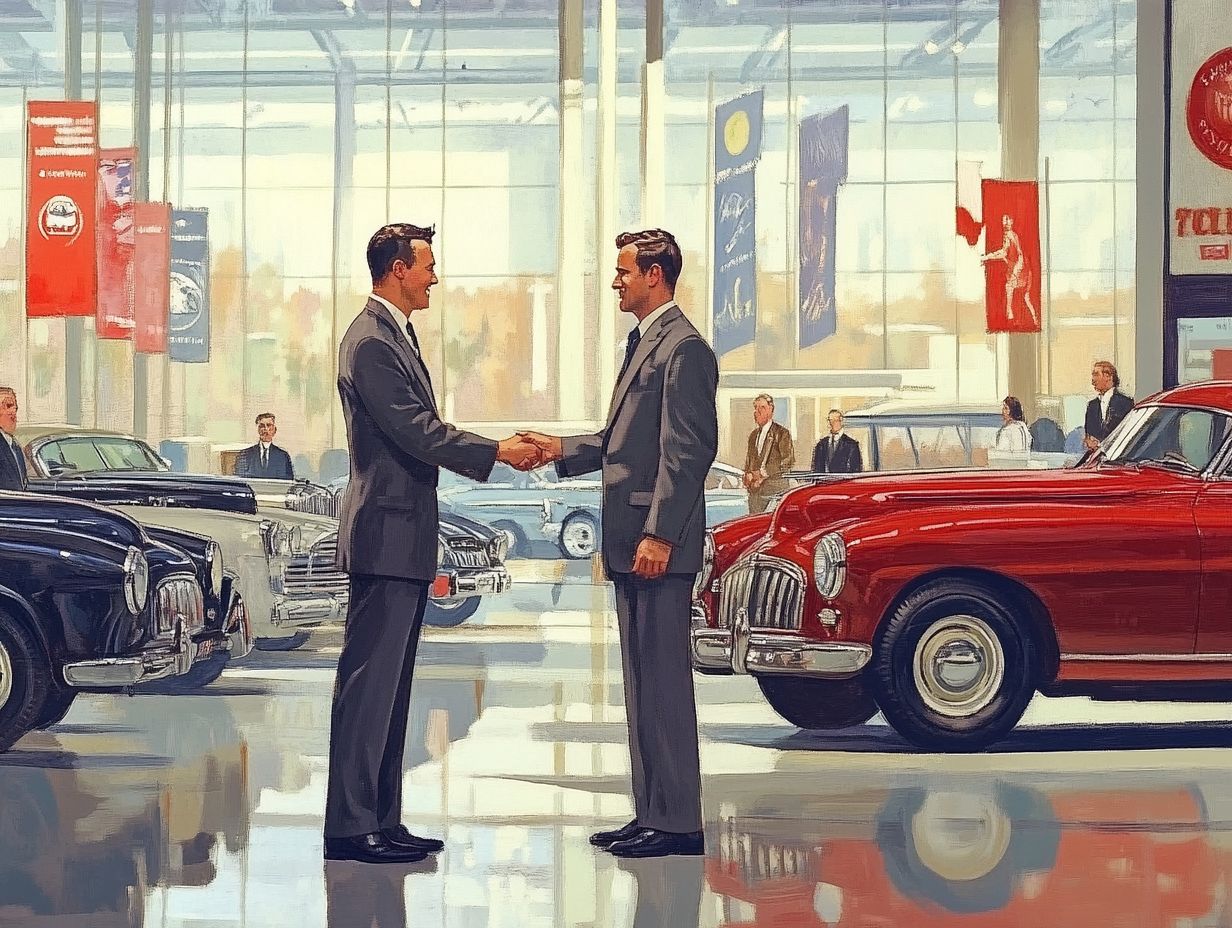
Trading in a vehicle has its perks, but be cautious of the potential pitfalls. One major concern is owing more than what your car is worth, which can complicate negotiations significantly.
You might find yourself needing to roll over that negative equity into a new loan, which could escalate your financial burden. Be aware that many dealerships require thorough checks of your car’s condition before they accept trade-ins.
This adds another layer of complexity. Any existing repair damage be it minor dents or significant issues can substantially reduce your vehicle’s trade-in value, often leading to offers that fall short of your expectations.
These factors can create hurdles that may result in less favorable negotiations, ultimately influencing the overall cost of upgrading to a new vehicle.
How Trade-Ins Affect the Cost of a New Car
Trade-ins are key! They can lower your car loan amount and put you in a better position to negotiate with dealerships.
Factors that Impact Trade-In Value
Many things can affect your trade-in value. Key factors include your car’s condition, its mileage, and whether you have complete service records.
Mileage is crucial; generally, lower mileage can significantly boost your vehicle’s appeal. A well-documented maintenance history fosters trust with dealers, positively influencing their offers.
Market demand can also fluctuate based on seasonal trends and regional preferences, with certain models enjoying a spike in desirability at specific times. By understanding these elements, you can make informed decisions that might maximize your return on investment.
Negotiating Trade-In Value

Negotiating your trade-in value is crucial. Prepare your paperwork and understand your car s worth to get the best offer.
To maximize your vehicle’s potential value, research current market conditions and have a clear grasp of your car’s worth before you set foot on the lot. Knowing the specific criteria dealerships use during appraisals like your vehicle’s condition and any standout features will empower you during negotiations.
Organizing all relevant documentation, from maintenance records to ownership history, showcases your vehicle’s value and streamlines the negotiation process. By approaching the trade-in conversation with preparation and confidence, you can often secure a more favorable deal that truly reflects your car’s worth.
Alternatives to Trading In Your Car
When contemplating alternatives to trading in your car, consider selling the vehicle privately or exploring leasing versus buying options.
These avenues often lead to competitive prices and can result in better financial outcomes for you.
Selling Privately
Selling your car privately often leads to a better market value and a more competitive price than trading it in at a dealership. This makes it an appealing option for you as a car owner.
By choosing this route, you can access a wider pool of potential buyers. This significantly increases your chances of receiving a higher offer. Selling directly allows for negotiations that can result in a more favorable final sale price, as there s no intermediary taking a cut of your hard-earned cash.
While it s essential to handle some challenges like the time and effort needed for advertising, meeting with potential buyers, and ensuring all paperwork is completed correctly the benefits often far outweigh these hurdles.
This approach boosts your financial gains and makes it easier to transition to your next vehicle.
Leasing vs. Buying a New Car
The choice between leasing and buying a new car significantly impacts your long-term vehicle ownership and financing strategies, especially when considering car loans at dealerships.
Understanding these distinctions is essential for making an informed decision aligned with your financial goals. When you lease a vehicle, you often enjoy lower monthly payments and the flexibility to drive a new car every few years. However, this means you forfeit long-term ownership value.
On the other hand, purchasing a car grants you full ownership, enabling you to build value over time. This option does come with a larger financial commitment upfront, including higher payments and potential maintenance costs as the vehicle ages.
Your interactions with the dealership can differ significantly between these two choices, influencing aspects such as trade-in processes and ongoing support.
Frequently Asked Questions
What is the impact of trade-ins on new car purchases?
Trade-ins can significantly affect the total cost of a new car purchase. By trading in your old car, you can potentially lower the amount you have to finance or pay in cash for the new car. This can help you understand the trade-offs in new car purchases, thus reducing the overall impact on your budget.
How do trade-ins affect the negotiation process for a new car?
Having a trade-in can give you more leverage in the negotiation process for a new car. The value of your trade-in can be used as a bargaining tool to lower the price of the new car or to negotiate better financing terms.
What factors determine the impact of a trade-in on a new car purchase?
The value of your trade-in depends on various factors such as the make, model, year, condition, and mileage of the car. The market demand for your specific trade-in vehicle can also impact its value.
Is it always beneficial to trade in a car when purchasing a new one?
It depends on the individual situation. If the trade-in value is significantly lower than the remaining loan balance, it may not be beneficial to trade in the car. It’s essential to consider all factors and do proper research before deciding to trade in a car.
Are there any alternatives to trading in a car when buying a new one?
Yes, you can also sell your old car privately or use it as a down payment for the new car. However, these options may require more effort and time compared to trading in the car at the dealership.
How can I get the best value for my trade-in when purchasing a new car?
To get the best value for your trade-in, it is recommended to do your research and compare offers from different dealerships. Consider getting your car professionally cleaned and serviced to increase its value.
Start your journey to a better price today!

